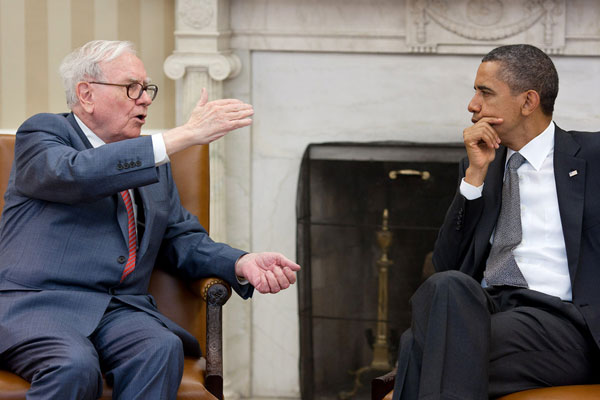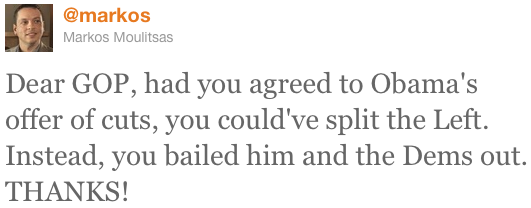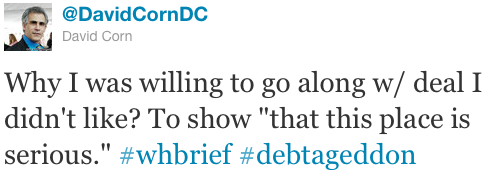
So early this evening negotiations between President Obama and House Republicans over raising the debt ceiling, cutting federal spending, and raising revenue, completely collapsed in a round of recriminatory press conferences (Obama; Boehner). The reaction from the Democratic base?
You might be surprised.





Meanwhile, here’s the view from the other side of the aisle. David Frum:
[House Republicans] issued demands they knew could not be met, for budget cuts much bigger than Republicans ever enacted when they had the power to enact them. They cocked the weapon. And now here we are: the demands are unmet and Republicans find themselves facing a horrible choice between yielding on their exorbitant demands or pushing the United States into financial upheaval.
So what’s the president’s motivation?

That tracks with an interesting catch the New York Review of Books‘s Elizabeth Drew made recently (emphasis mine):
This all fits with another development in the Obama White House. According to another close observer, David Plouffe, the manager of Obama’s 2008 presidential campaign, who officially joined the White House staff in January 2011, has taken over. “Everything is about the reelect,” this observer says—”where the President goes, what he does.”
Plouffe’s advice to the President defines not just Obama’s policies but also his behavior. Plouffe tells the President, according to this observer, that the target group wants him to seem the most reasonable man in the room. Plouffe is the conceptualizer, and Bill Daley, the chief of staff who shares Plouffe’s political outlook, makes things happen; Gene Sperling, the director of economic policy, and Tom Donilon, the national security adviser, are smart men but they come out of politics rather than academia or deep experience in their respective fields.
One way of looking at it, I guess, is that Obama is free to toe the right center of the line because he knows anything short of full capitulation is unacceptable to House Republicans, and by venturing much, much farther left than the progressive wing of his party wants, he looks reasonable by asking for nothing…
The best way to understand the revenue in this plan, in fact, is that it’s a concession to Republicans, not Democrats. It effectively takes the 2012 expiration of the Bush tax cuts and all of the leverage that gives Democrats off the table, but doesn’t ask for more revenue in return.
…and getting nothing in return.
But as James Kwak notes, there’s another reason to ask for nothing:
So as far as I can tell, Obama is handing the Republicans $3 trillion in spending cuts, and also handing them $3 trillion in tax cuts. There are only two possible interpretations that I can think of. One: Obama thinks this is the best deal he can get — but if that’s the case, then you have to ask why his starting point wasn’t letting all of the tax cuts expire. Two: Obama thinks this is a good outcome.
But that’s what everyone thinks in the idyll of his or her own heart right now. What’s next?
No one knows, as far as I can see.
* Nobel Prize-winner Paul Krugman thinks the President will call the GOP’s bluff and just pay the debt anyway.
* Economist Mark Thoma thinks the market will panic, causing Congress to panic, and the debt ceiling will get raised the old-fashioned way (the market is already not not panicking).
* Financial writer Francine McKenna sees that happening but only after the debt ceiling raise gets defeated once.
It’s chaos. No one knows what the powers that be want. What do the people want? They don’t know, either.
Photograph: The White House


